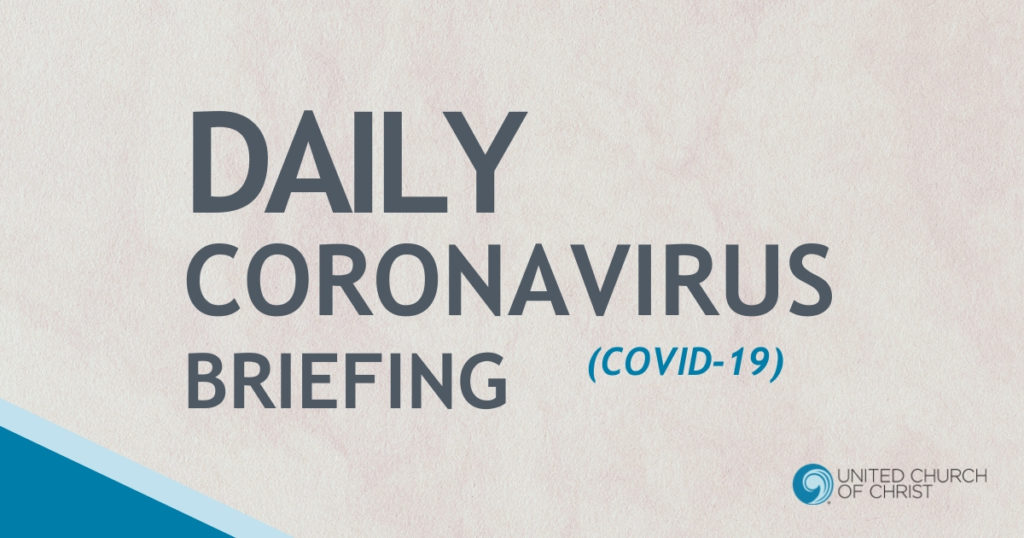The COVID-19 Back-to-School Debate
United Church of Christ – Wider Church Ministries
Humanitarian Development Team
Coronavirus (COVID-19) Daily Briefing
Barbara T. Baylor, MPH – Temporary Health Liaison
The COVID-19 Back-to-School Debate
This time of the summer, parents, teachers and students usually begin counting down the days before school starts. By now, teachers have provided shopping lists and families are beginning to work on getting the supplies that will be needed for each class.
Atop the list of items in 2020, the Centers for Disease Control (CDC) suggests families provide face masks for students. Younger students’ families are encouraged to label their children’s face masks with permanent marker and to teach them to put on and remove their masks without touching the cloth. Also on the list: a labeled plastic bag to put the masks in during lunch.
Data suggest that children under 10 are not as susceptible as adults to COVID-19, the disease caused by the coronavirus. And when these younger children are infected, it’s relatively rare for them to develop serious complications or require hospitalization. As a result, many think a return to in-person school is a viable option.
But this doesn’t mean classrooms can be exempt from social distancing and other safety precautions. Schools should not start back on site without good plans.
According to USA TODAY, the CDC has faced considerable political pressure from President Donald Trump and others to get schools reopened. Public health experts have pushed back, urging caution. Reducing community spread of COVID-19 is key to reopening schools, they say, and in many parts of the country officials are planning for school reopenings even as transmission rates continue to rise.
The USA TODAY analysis, published Thursday, shows the country’s biggest school systems are in far worse public health contexts now than they were in the spring as the school year waned. In all, 11 of the 15 largest U.S. school systems are in communities adding COVID-19 cases at more than three times the rate they were in the two weeks ending May 1.
The CDC has published a decision-making checklist for parents, caregivers and guardians to help them decide between in-person and virtual learning. It is available in English, Spanish, Chinese, Vietnamese and Korean.
And what about the teachers and administrators?
Teachers and administrators may find it challenging to try to balance their commitment to the job and love for the students and families they serve with commitment to their own families, children and health. With so much stress, it may be challenging to plan amazing, engaging, enriching, rigorous lessons if they are fearful they may get sick, or worse, die. If they are forced to work in unsafe conditions, many of them simply won’t return to implement plans to start the school year.
According to Shayla Griffin, a PhD and licensed Social Worker, we are dealing with an absolute disaster of epic proportions with no good answers, no clear sides.
The equity, social justice and science issues have at least two competing justice issues on the table – the risk of not having school for the students most marginalized, and the risk of schools spreading a deadly disease to the students and families who are most marginalized. Choosing one inherently worsens the other, Griffin said.
Going back to school gives children the benefits of academics, social connections and services they need, she acknowledged. But it carries the risk of contracting COVID-19 or spreading it to parents, grandparents, siblings, friends and teachers.
Then again, if the focus is only on the spread of this deadly disease, we risk huge numbers of students seeing whatever futures they had envisioned going down the drain, Griffin said. And both of these issues are leading to a third concern – a mental health crisis of a generation of Americans.
Before you decide what’s right for you and your family, check the data in your local area on numbers of cases and rates of transmissions. Familiarize yourself with – even better, get involved in – your school district’s deliberations on the best way to proceed.
Today’s briefing is by guest writer the Rev. Phyllis Richards, Acting Team Leader, Global H.O.P.E., which is part of UCC Wider Church Ministries.
COVID-19 Daily Briefing Archives
See Also: Racial and Ethnic Disparities – Information for Action Archive
Related News
Growing Weary
In December 1964 during a speech in Harlem, Fannie Lou Hamer declared: “And you can always...
Read MorePlanning for Earth Month: Resources for Congregations
April is Earth Month, and for congregations, it can be a great time to further discern how...
Read MoreBodily Autonomy Means Every-BODY
Advocacy and Action for Women's and Gender Justice Local events stir thoughts and...
Read More


